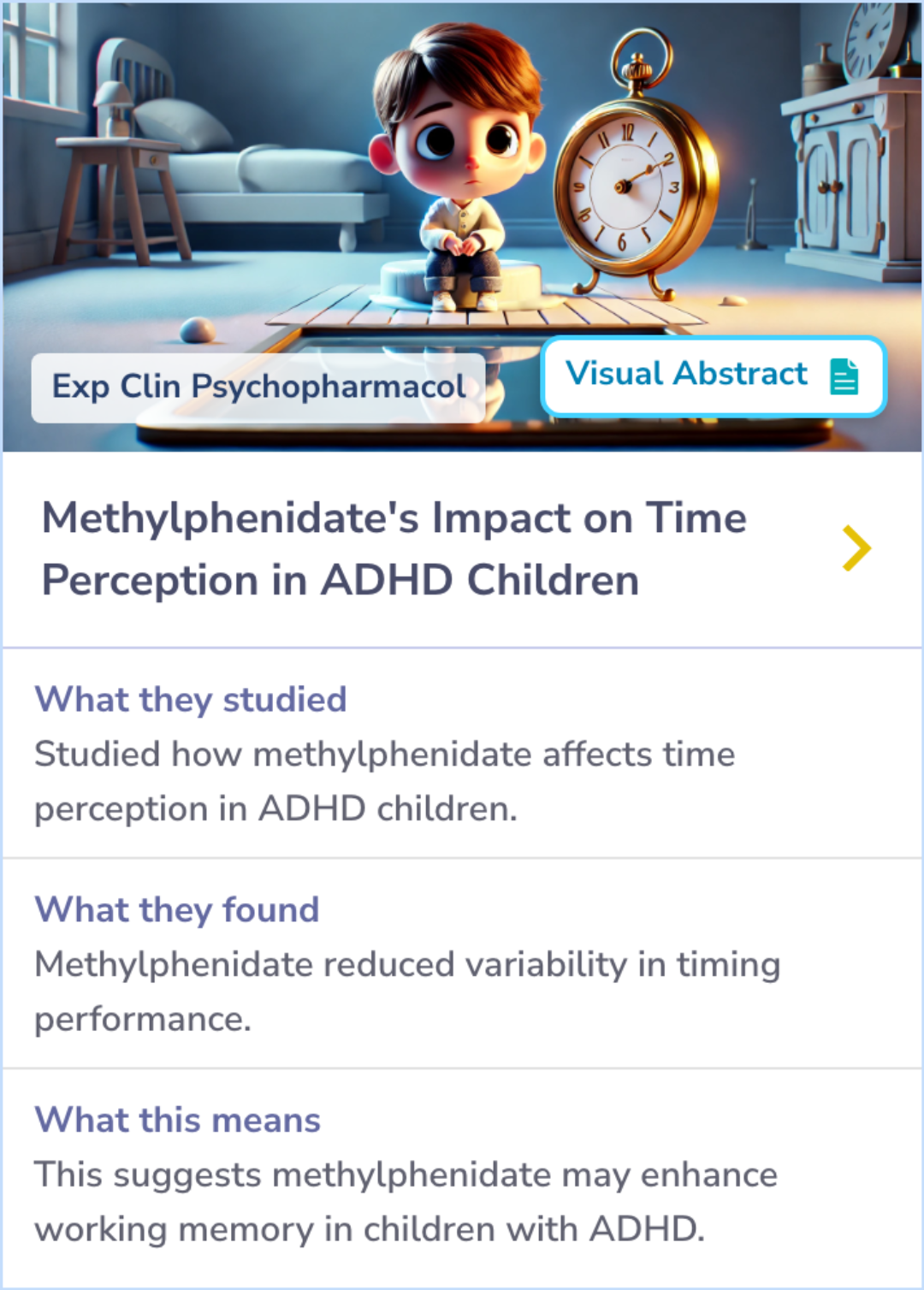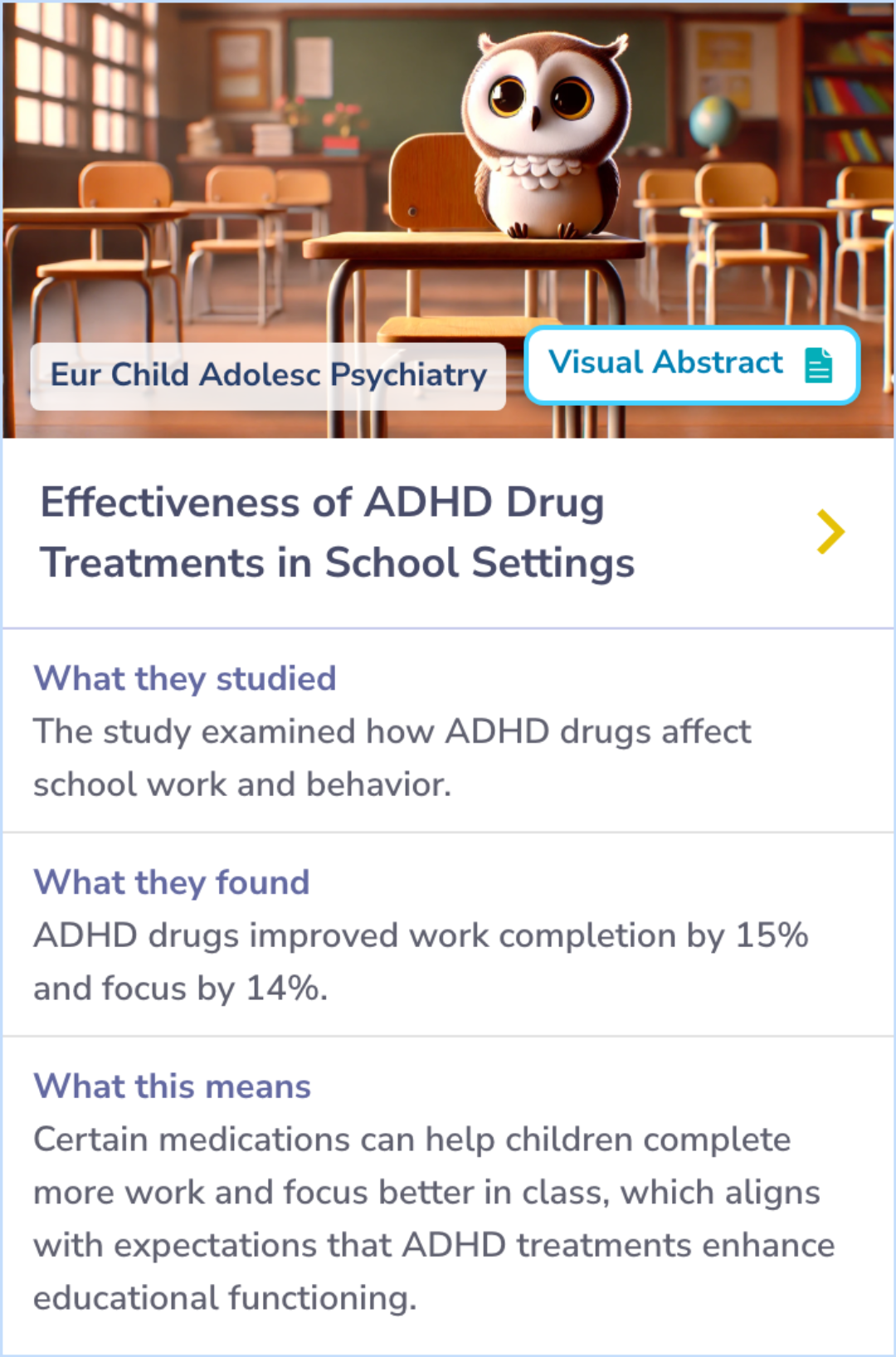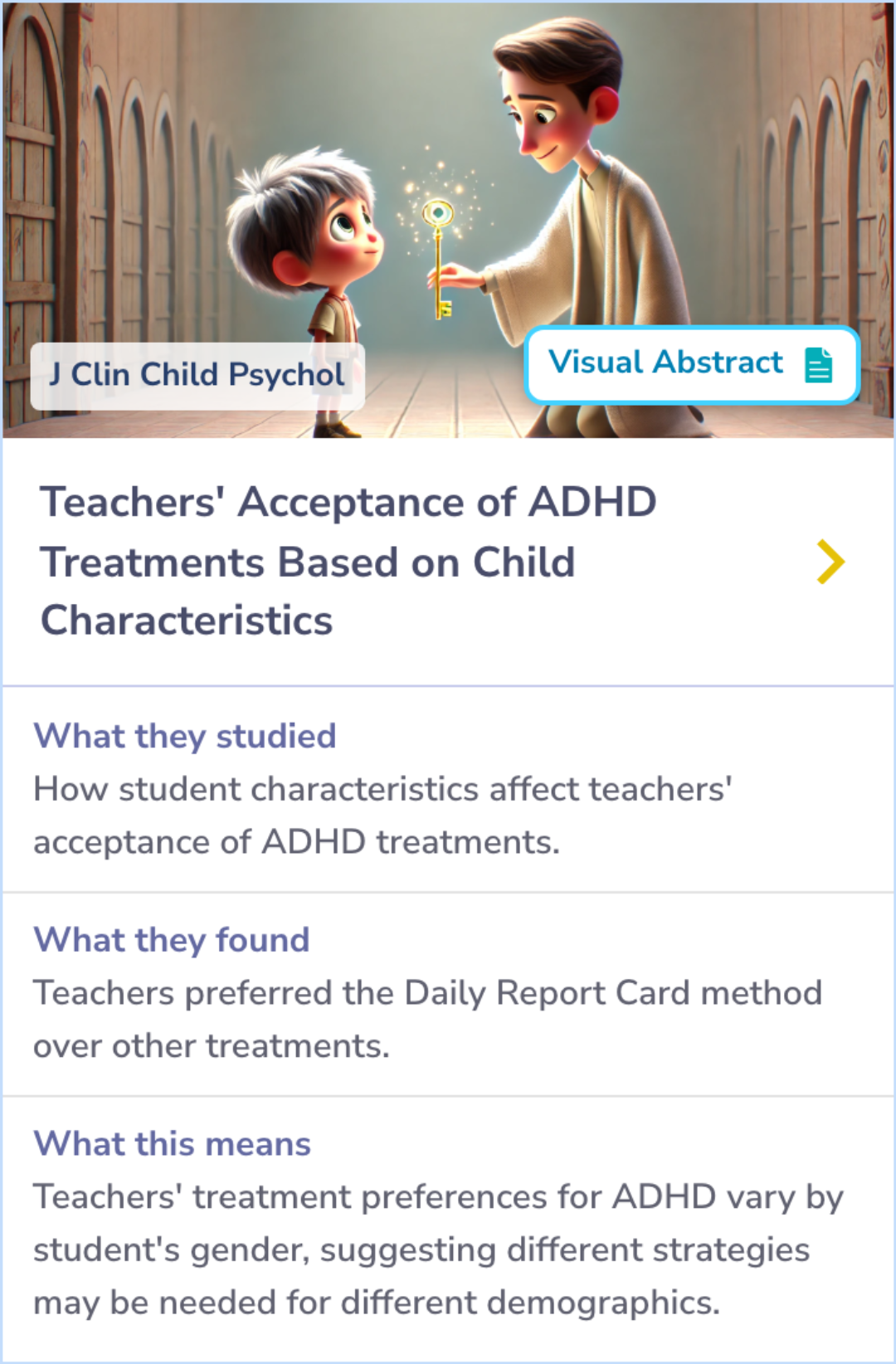Ritalin
Evidence Based Answers
Does Concerta Affect Growth?
Published: August 27, 2024
Studies Summary
📉
Growth Suppression with Long-Term Concerta Use
Long-term use of Concerta may slow growth in height and weight, especially during key developmental years. Studies suggest that children on Concerta may grow about 2 cm less in height and 2.7 kg less in weight over three years compared to those not on the medication.
📋
Monitoring Growth During Concerta Therapy
Regular monitoring of height and weight is important for children on Concerta. This helps to identify any potential growth issues early. If a child is not growing or gaining weight as expected, adjustments to the medication might be necessary.
🛑
Considering Medication Breaks for Growth Slowdown
If a child experiences significant growth slowdown while on Concerta, healthcare providers might suggest 'drug holidays'—short breaks from the medication. These breaks can help assess if growth rebounds when the medication is not in use.
Growth Suppression with Long-Term Concerta Use
Long-term use of Concerta may slow growth in height and weight, especially during key developmental years. Studies suggest that children on Concerta may grow about 2 cm less in height and 2.7 kg less in weight over three years compared to those not on the medication.
This effect appears temporary, but there is no evidence of growth rebound during this period, so regular monitoring is important to detect any issues early.
This effect appears temporary, but there is no evidence of growth rebound during this period, so regular monitoring is important to detect any issues early.
“
Source Quotes:
Careful follow-up of weight and height in children... suggests that consistently medicated children... have a temporary slowing in growth rate... without evidence of growth rebound during this period of development.
Anorexia is a common adverse effect of stimulant use, and there have been concerns that methylphenidate may suppress growth in children being treated for ADHD.
Monitoring Growth During Concerta Therapy
Regular monitoring of height and weight is important for children on Concerta. This helps to identify any potential growth issues early. If a child is not growing or gaining weight as expected, adjustments to the medication might be necessary.
Consistent follow-up helps to avoid long-term impacts on a child’s growth.
Consistent follow-up helps to avoid long-term impacts on a child’s growth.
“
Source Quotes:
In children, it is essential to evaluate their growth curve for a stable progression in height, and weight since methylphenidate has demonstrated growth suppression when used daily, long-term.
The child's height, weight, blood pressure, and pulse should continue to be monitored during the maintenance stage. Additional adverse effects must be monitored closely because stimulant medication may be used for many years.
Considering Medication Breaks for Growth Slowdown
If a child experiences significant growth slowdown while on Concerta, healthcare providers might suggest 'drug holidays'—short breaks from the medication. These breaks can help assess if growth rebounds when the medication is not in use.
Drug holidays should only be considered if they do not cause major impairment to the child's daily functioning.
Drug holidays should only be considered if they do not cause major impairment to the child's daily functioning.
“
Source Quotes:
Poor growth – Drug holidays may be beneficial for children in whom stimulant therapy is associated with a growth trajectory that crosses two major percentiles.
Concerta’s Impact on Growth Hormones
Concerta affects growth hormones by increasing dopamine levels, which might contribute to growth suppression. The exact biological mechanisms are complex and not fully understood.
Research is ongoing to understand how these hormonal changes specifically impact growth, but it is clear that dopamine plays a role in this process.
Research is ongoing to understand how these hormonal changes specifically impact growth, but it is clear that dopamine plays a role in this process.
“
Source Quotes:
Methylphenidate releases dopamine from presynaptic reserpine-sensitive intracellular storage sites and inhibits dopamine reuptake... anticipated that methylphenidate would be expected to decrease prolactin secretion and enhance the secretion of growth hormone.
Variability in Growth Response to Concerta
Children’s responses to Concerta can vary widely. Some may experience more pronounced growth suppression than others. This variability requires healthcare providers to tailor treatment plans based on each child’s response to the medication.
Understanding this variability helps optimize treatment to minimize adverse effects while maintaining the medication’s benefits.
Understanding this variability helps optimize treatment to minimize adverse effects while maintaining the medication’s benefits.
“
Source Quotes:
Imaging studies have documented large variability between subjects in the magnitude of the dopamine changes induced by methylphenidate... the differences in the amount of methylphenidate-induced dopamine increases may reflect differences in dopamine cell activity.
Key Takeaways
Conclusions
Research indicates that long-term use of Concerta might slow children's growth in both height and weight. While these effects—occurring mainly during key developmental years—appear temporary, regular monitoring is crucial, as there is no clear evidence of growth rebound during treatment. Ensuring that a child's height and weight are tracked consistently helps identify any growth issues early, allowing for timely adjustments in medication if growth rates are not as expected.
In cases of significant growth slowdown, healthcare providers may suggest 'drug holidays,' or brief breaks from Concerta, to see if growth catches up. This approach, however, should be balanced against the risk of impairing the child's daily activities. The variability in how children respond to Concerta underlines the importance of personalized treatment plans to manage growth suppression effectively while still providing the medication's benefits.
In cases of significant growth slowdown, healthcare providers may suggest 'drug holidays,' or brief breaks from Concerta, to see if growth catches up. This approach, however, should be balanced against the risk of impairing the child's daily activities. The variability in how children respond to Concerta underlines the importance of personalized treatment plans to manage growth suppression effectively while still providing the medication's benefits.

Evidence Summary
Methylphenidate Enhances Consistency in Timing Tasks for ADHD Children
Methylphenidate did not change the number of correct responses or the average lever hold time in ADHD children during a time-production task. However, it made their timing more consistent by reducing response variability. It increased the frequency of lever holds within the 10-11 second range and decreased those of very short durations.
These results indicate that while the overall performance remains unaffected, the precision and consistency of timed tasks improve with the medication.
These results indicate that while the overall performance remains unaffected, the precision and consistency of timed tasks improve with the medication.
Evidence Summary
ADHD Medications and Classroom Performance
Attention-deficit hyperactivity disorder (ADHD) significantly impacts children’s behavior and school experiences. A review examined how medications like methylphenidate and dexamfetamine affect classroom behavior and academic performance. These drugs helped children complete more schoolwork and improved focus, though results varied. Mixed amfetamine salts also showed benefits, while atomoxetine had no notable effect.
The review highlights that different medications can enhance task behavior and school work completion to varying degrees, offering insights into how children with ADHD might better manage their academic challenges.
The review highlights that different medications can enhance task behavior and school work completion to varying degrees, offering insights into how children with ADHD might better manage their academic challenges.
Evidence Summary
Teachers’ ADHD Treatment Preferences Depend on Student Characteristics
Experienced elementary school teachers rated the acceptability of different ADHD treatments after reading vignettes depicting students with consistent symptoms of varying subtypes and sexes. Teachers showed a preference for daily report cards over other treatments. Treatment acceptability varied significantly based on the sex of the student, with behavioral strategies generally favored over medication.
Teachers rated based on factors like Treatment Acceptability, Treatment Effectiveness, and Timeliness, revealing nuanced preferences for interventions depending on the child's sex.
Teachers rated based on factors like Treatment Acceptability, Treatment Effectiveness, and Timeliness, revealing nuanced preferences for interventions depending on the child's sex.


